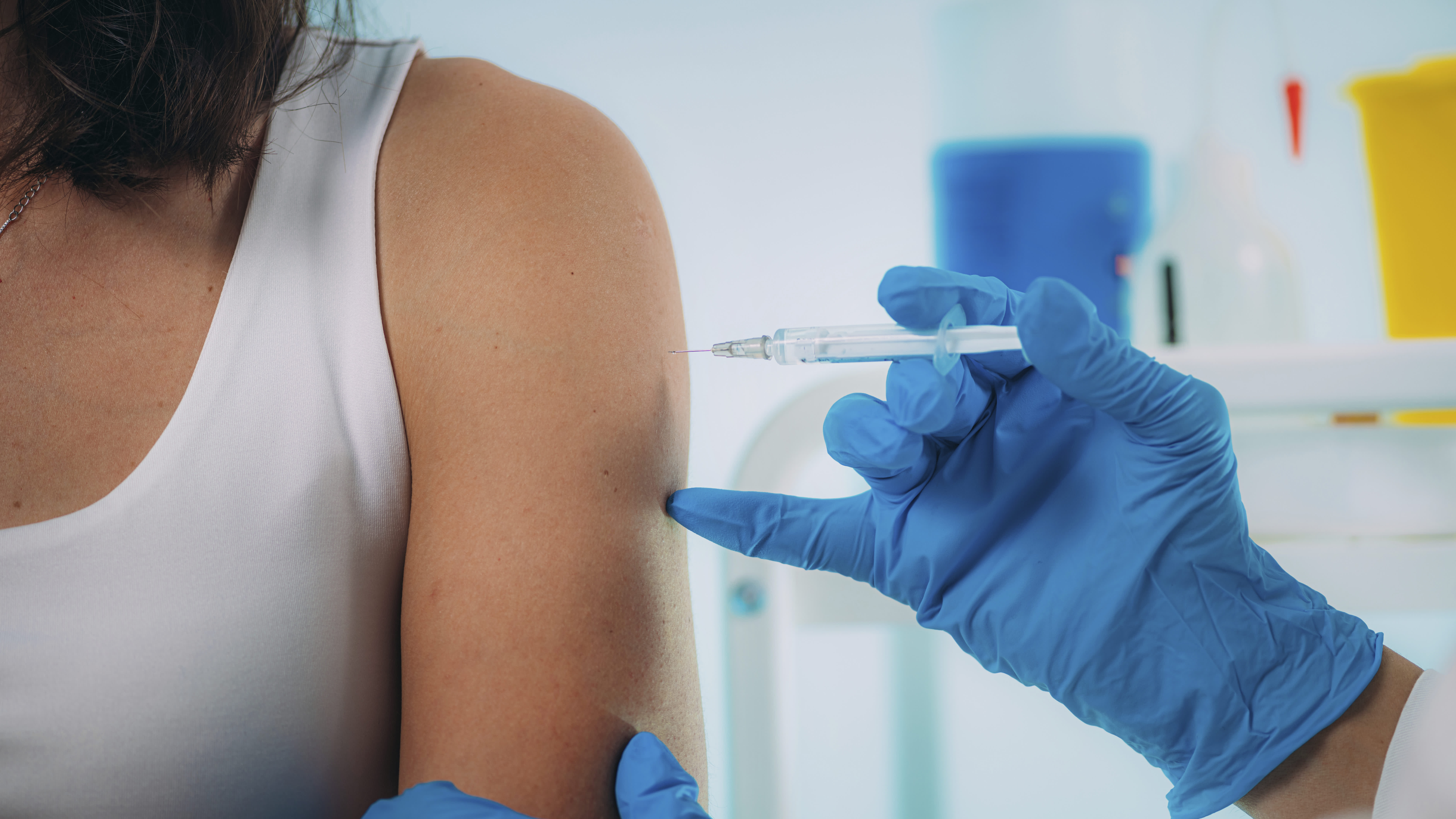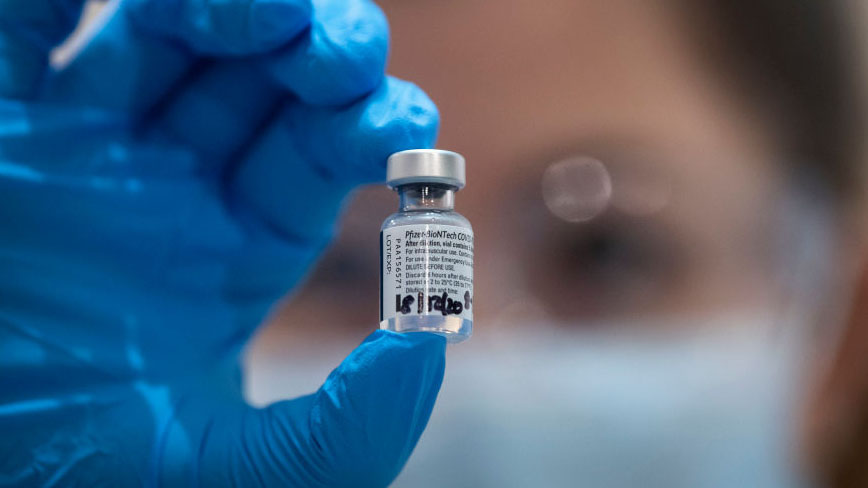What to Know
- The first vaccine shot was administered to a critical care nurse in Queens, New York, on Monday; some 10,000 in the state were expected to get their first dose, Gov. Cuomo said
- Widescale vaccination isn't expected until late next spring or summer at the earliest; in the meantime, officials are facing severe viral resurgence
- Hospitals will stagger inoculations over the coming days for the most at-risk frontline healthcare workers: respiratory therapists, ICU nurses and emergency room physicians
It was the shot seen around the world — or at least around the country.
Almost 300 days after New York City's first confirmed case of the coronavirus, the first of the nation's vaccine doses were administered to frontline healthcare workers.
Northwell Health, the state's largest healthcare provider, began vaccinating hospital workers Monday morning. The first vaccine in the state, and reportedly first in the nation, went to critical care nurse Sandra Lindsay at Long Island Jewish Medical Center in Queens.
“It didn’t feel any different from taking any other vaccine," Lindsay reassured. "I feel hopeful today, relieved. I hope this marks the beginning to the end of a very painful time in our history."
The ICU nurse got the vaccine dose, with Gov. Andrew Cuomo and much of the world watching, after learning just moments earlier she would be the first in New York to receive the shot. Back in the spring, Lindsay treated hundreds of COVID patients as her hospital tripled the size of its ICU, but was never contracted COVID.
New York's first shipment of the vaccine arrived at John F. Kennedy Airport shortly before 6 a.m., not far from LIJ-Queens, several people briefed on its timeline tell News 4. Officials were able to prepare and inoculate the first person by 9:15 a.m. Lindsay said she thought out family and friends who have told her they're skeptical about the vaccine.
"I want to say to them today, they should trust science. Although created quickly, no corners were cut," Lindsay said. "The alternative is painful and dark and involves death, and I don't wish that for anyone."
A short time later, Dr. Yves Duroseau, chair of emergency medicine at Lenox Hill Hospital, became the second to be vaccinated. Cuomo said 10,000 people would get vaccinated in the state on Monday, as delivery trucks with cold storage freezers transported Pfizer vials throughout the weekend and continued Monday.
"Today is a major step. And this is what's gonna get us through," said Dr. Duroseau. "We cannot continue to have 3,000 people a day die. This has to stop, and the only way tp o stop this is with the vaccine."
Also poised to receive the first shots arriving in New York this week: residents and staff of long-term care and nursing home facilities. It's a historic day in the battle against the virus that has killed nearly 300,000 in the U.S. and at least 50,000 people locally.
Hospitals will stagger inoculations over the coming days for the most at-risk frontline healthcare workers: respiratory therapists, ICU nurses and emergency room physicians.
"Some people will have mild flu-like symptoms the next day or two after getting the vaccine. What we don't want to therefore vaccinate in one hospital every ICU nurse and therefore risk that we have no ICU nurses to take care of patients on the next day, so we'll stagger it," Dr. Mitchell Katz, NYC Health + Hospitals CEO, said Monday.
Five hospitals in New York City, including Lenox Hill and LIJ-Queens, were scheduled to receive their first shipments of the Pfizer/BioTech vaccine on Monday. Health Commissioner Dr. Dave Chokshi says shipments will arrive at 37 additional hospitals on Tuesday and two more hospitals Wednesday. In total, New York City is preparing to receive some 465,000 vaccine doses in the first three weeks following the emergency use authorization, Chokshi said.
'The plan is for doses over the next days to be used over the next week and a half," said Chokshi.
More on the Vaccine
The focus, for tri-state officials, will be an expedited and equitable vaccine rollout -- one that recognizes the challenges in reaching historically underserved communities as well as undocumented immigrants. New York City opened a new Vaccine Command Center Monday, a hub intended to streamline distribution and ensure its hardest-hit communities have access. States have also outlined plans.
Looking beyond the first shipments of the vaccine from Pfizer/BioTech, health leaders in New York and New Jersey hope to see a review of Moderna's vaccine by the end of the week, ensuring additional vaccine doses could come soon after.
Experts say 75 percent to 85 percent of the entire state population must be vaccinated in order for the economy to return to some semblance of normalcy. That may not happen until June 2021, Cuomo has said. That's the finish line.
"It's going to take months for the vaccine to hit critical mass. There's light at the end of the tunnel, but it's a long tunnel," Cuomo said.
In the meantime, more needs to be done now to mitigate the current surge continuing its warpath across America. Indoor dining in New York City is suspended as of Monday by order of the governor.
Hospitalization rates have increased almost across the board in New York state, a consequence of the latest national flood in cases. Daily deaths are on the rise, too, though both those and hospitalization rates are at much lower levels than they were in April. Length of admission has also been profoundly reduced.
The core metrics also have been rising in New Jersey, which set another new single-day COVID case record of the weekend. That state plans to start administering vaccines Tuesday out of University Hospital in Newark. Gov. Phil Murphy hopes all residents will have vaccine access by April or May, he has said.
University Hospital's COVID-19 Vaccine Clinic has the capacity to conduct at least 600 vaccinations daily, the governor's office said. During Murphy's visit on Tuesday, a number of the hospital's "healthcare heroes" are expected to receive their first dose of the vaccine.
He’s urging people not to relax efforts to stem the spread of the virus, especially limiting holiday celebrations to immediate family, since he said 60 to 80 percent of transmission is now occurring in private settings.
University Hospital and Hackensack University Hospital have received their first shipments of the vaccine, Health Commissioner Judy Persichilli confirmed Monday afternoon. 53 hospitals in total will receive the Pfizer vaccine, with another 18 awaiting the vaccine from Moderna once it receives emergency use authorization.
The president of University Hospital in Newark said that calls for employees to get in line for the shots are much greater than expected — a welcome sign in a city that has been hit particularly hard by the virus.
By her figures, Persichilli says approval of the Moderna vaccine could come this weekend and the first shipments following early next week., assuming a mid-week snowstorm doesn't throw anything off-track. The state is expected to get 154,000 of the Moderna vaccine once its ready.
Connecticut, too, inoculated its first frontline workers on Monday. Director of Infectious Diseases at Hartford Healthcare Keith Grant received his first dose of the vaccine not long after New York administered its first doses, with 15 critical care doctors and nurses in the state getting the shot. More hospitals eagerly await the vaccine that was partially developed in Connecticut at Pfizer's facility in Groton.
Gov. Ned Lamont warned that while the 31,000 doses ordered by the state, some of which will go to nursing homes next week, do offer a shimmer of hope, there's still a long road ahead.
"We've got a lot more wearing masks to do, we've got a lot more being careful to do, especially during the holiday season," the governor said.



